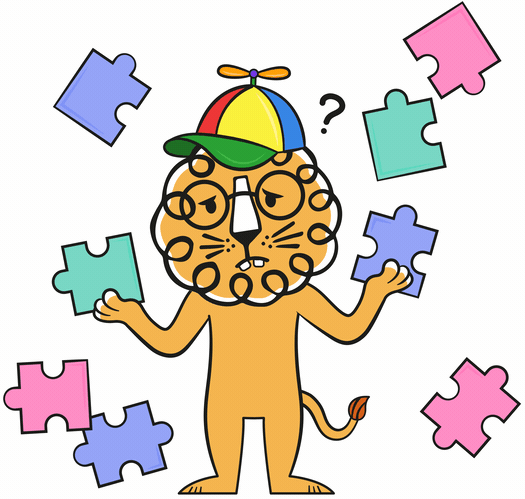More Knowledge = More Powah! - Leon! Animation Studio
Sometimes in life, you come up against a problem so big, a nut so hard to crack, a conundrum of such gargantuan proportions...
Your only choice of solving it is to grab a cup of coffee, Funyuns (or a comparable snack of your choice), turn to the dark overlords behind Google’s algorithm and get to typing.
While we'd all love to think that we're ready for every problem in our profession, we've all been here before. Sometimes, the need to do additional research is unavoidable. At Leon! Animations we pride ourselves on our thorough research process. It's still the cornerstone of everything we do.
Here's why…
Research- It's Important And Stuff
Do you know what makes puzzles inherently difficult to solve?
Context.
Or, to be more specific, the lack of context.
Puzzles challenge our ability to make inferences. That's why the early stages of those gigantic 2000-piece puzzles your grandmother once played were so hard. All of the pieces looked the same. You had to hold each piece in reference to another to start putting it together.
Within the context of the puzzle- you conducted RESEARCH.
It also doesn’t matter what type of puzzle it is. You’ll find the same basic formula.
Confusion + Context = Solution
Genuinely, the problems you run into in daily life or at work are like puzzles. You need to research to gain more information (context) to solve them. That information, in turn, makes the problem-solving far more straightforward than it would have been otherwise.
Knowledge quite literally empowers your problem-solving. So whoever first said that "Knowledge equals power" deeply understood problem-solving.
You Build Credibility
Solving problems with good research puts you in an excellent position to solve these same issues for others.
You've probably experienced an "Aha!" moment when solving a problem yourself. Somewhere in the research process, you stumble across that one detail that set off a lightbulb in your brain, and within a few minutes- you'd solved the problem that had plagued you for hours.
Chances are, there are hundreds or even hundreds of thousands of people in the same position as you. They banged their heads into a plastic desk and almost spilt coffee over their keyboards because the Google overlords were not kind in their search results.
When you pass along your solutions to these problems, you also pass along that "Aha!" moment.
People are shocked that they hadn't thought of "such a simple solution". They give you credit for solving the problem by default, so what happens if they have another issue in a similar space?
They come to you again.
Once this cycle has played out a few times, you're an authority in the space. Leon! Animations has found ourselves in similar circumstances a few times when designing 2D explainers, which is why we're such an authority on animations for think tanks today!
(There's only a little bit of Horn-tooting left, I promise.)
You Enhance Other Aspects of Your Work
Humans have an uncanny ability to draw parallels and abstract comparisons between circumstances. You may not realize it at the time, but solving one problem in a specific area can enhance your problem-solving abilities in other areas.
The reasons behind it are pretty common sense too.
For one, by conducting more research, you become more efficient at research. You develop an understanding of the core components of your "typical" problem, and you can quickly identify the strings and start pulling until it all unravels.
Take, for example, how Indian drummers learn new rhythms. They learn to 'sing' the rhythm first to grasp it conceptually before translating it to drums. This process, called "Konnakol", is technically a method of researching a rhythm vocally before learning it with your hands.
Method acting is another poignant example of research. Method acting involves 'immersing' oneself in the conditions that their character would have experienced or lived. In preparing for his role as "Bill the Butcher" in Gangs of New York, Daniel Day-Lewis refused to wear an insulated coat- even between takes!
His commitment gave him a deeper emotional connection to and understanding of the mindset of Bill the Butcher. Ultimately, he was diagnosed with pneumonia and, despite that, persisted in his research method.
Second, many problems within your field share fundamental principles. And chances are, by solving a problem that had been stumping you for some time, you've filled in a significant knowledge gap. If that gap happens to be one of the core principles in your field, you'll find yourself applying that knowledge over and over, helping you solve problems more efficiently.
This final point is one of the reasons that Leon! Has been able to handle big projects by some of the UK's most prominent think tanks. We've done animations that simplified solutions to the UK housing crisis, explanations of the greenhouse effect and climate change, and even 2D animations explaining the role of AI in insurance.
We've become good at research and now have an intuitive understanding of the nature of problems in general. So, look no further if you're looking for someone to animate a complicated message.
Please don't assume that our naivety in your field is a disadvantage. Of course, we're not experts in everything. Who can be?! However, our lack of context helps us see the forest through the trees. Sometimes, being stuck in with all the details inhibits our ability to see and connect the bigger picture. These same concepts are the core of most good animations because they explain messages succinctly.
Our research process helps us quickly identify core concepts, compare them to your desired message, and create an explainer that clarifies things for your audience.
Click on the image below, and we'll be right with you!
Discover all 10 of our Simplification Commandments: 1) What's the 1st Step?, 2) Knowledge = Powah!, 3) Explain to Toddlers, 4) eXpEriMenT!, 5) Devil's Advocate, 6) Steal Sh*t!, 7) Take a Brake!, 8) Change Goals, 9) Give Up!, and 10) Ask for Help.
Our animation studio services for charities and healthcare organisations use these same principles to transform complexity into crystal-clear explainer videos.









